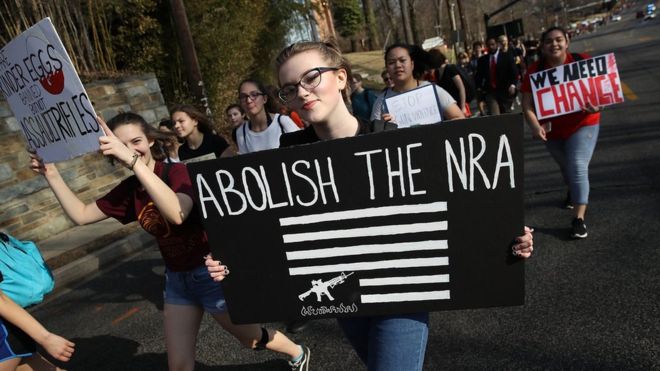More than half a dozen US companies have cut ties with the National Rifle Association (NRA) as consumers urge a boycott of businesses linked to the politically powerful gun lobby.
The firms included car rental giants Hertz and Enterprise, which offered discounts for NRA members.
The moves follow NRA leader Wayne LaPierre’s speech defending gun rights.
They were the NRA’s first public comments since a deadly school shooting in Florida.
Mr LaPierre said “opportunists” were using the 14 February tragedy, in which 17 people were killed, to expand gun control and abolish US gun rights.
In other developments:
President Trump said an armed officer stationed at the school who did not enter the building where the shooting was taking place was a “coward”
CNN reports that in addition to the armed officer, three Broward County deputies were waiting outside the school doing nothing to confront the shooter when Coral Springs police arrived
Florida Governor Rick Scott, a gun lobby supporter, urged state lawmakers to restrict access to firearms for young people and the mentally ill
How did the boycott come about?
Activists have tried to put pressure on the NRA since the shooting by targeting firms that offer discounts and other benefits to its members.
Trump: Florida school officer ‘didn’t have the courage’
US gun control: What is the NRA and why is it so powerful?
Six radical ways to tackle US school shootings
They have flooded its corporate partners with comments on social media under the hashtag #BoycottNRA. Firms under pressure include delivery company FedEx and tech giants such as Amazon, which distributes NRA television programmes.
Which companies have cut NRA ties?
On Thursday, the family-owned First National Bank of Omaha said it would not renew NRA-branded credit cards, citing “customer feedback”.
Enterprise Holdings, which owns the rental car brands Alamo, Enterprise and National, also said discounts offered to NRA members would end on 26 March.
The firm, which announced the move in response to comments on Twitter, declined to say why it had taken such a step but told a customer that the firm doesn’t “sponsor, endorse or take a political stance on any organizations.”
Other companies distanced themselves from the NRA on Friday.
Those included MetLife Insurance, the Avis Budget Group, home security firm Simplisafe, two moving brands – Allied Van Lines and northAmerican Van Lines – and Symantec Corp which had offered discounts for its LifeLock identity theft product.
Insurance firm Chubb also said it had stopped underwriting an NRA-branded insurance policy three months ago.
In Florida, the president of the Florida Education Association, which represents teachers’ unions, also called on the state to look at pension holdings in gun companies in a statement to the Miami Herald newspaper.
However other companies continue to offer discounts to NRA members. On its website, the NRA says US airlines Delta and United are offering special flight discounts to NRA members travelling to Dallas for the organisation’s annual meeting in May.
What has the NRA said?
The NRA, which claims five million members, did not respond to a request for comment about effect of the boycott.
The group defended itself in comments on Twitter, saying people upset about the shooting should focus on lapses by law enforcement.
“Instead of placing the blame on an organization that defends everyone’s #2A rights, maybe people should take a hard look at the number of failures by the FBI and local law enforcement agencies, or does that not fit your agenda?” it wrote, referring to the constitutional amendment that protects gun rights.
Prior campaigns aimed at the NRA have had limited results.
President Donald Trump has defended the NRA, while others criticised the boycott on Twitter.
What other issues are attracting boycotts?
The campaign comes as US businesses increasingly find themselves entangled in political debates, as activists target them on issues such as LGBTQ rights, as well as ties to the president.
Companies such as retailer Nordstrom and sportswear brand Under Armour are among the firms that have been subject to calls for boycotts from the left and right.
Executives serving on presidential councils, including the former chief executive of Uber, have resigned from the advisory groups after consumer pressure. The councils eventually disbanded last summer.
North Carolina last year also rescinded a law that restricted bathrooms for transgender people after a boycott by businesses and sports leagues.
BBC

